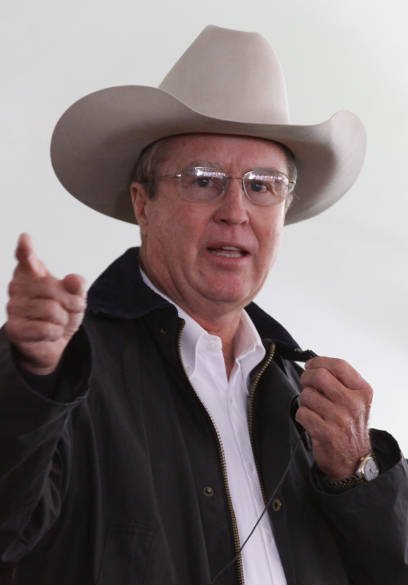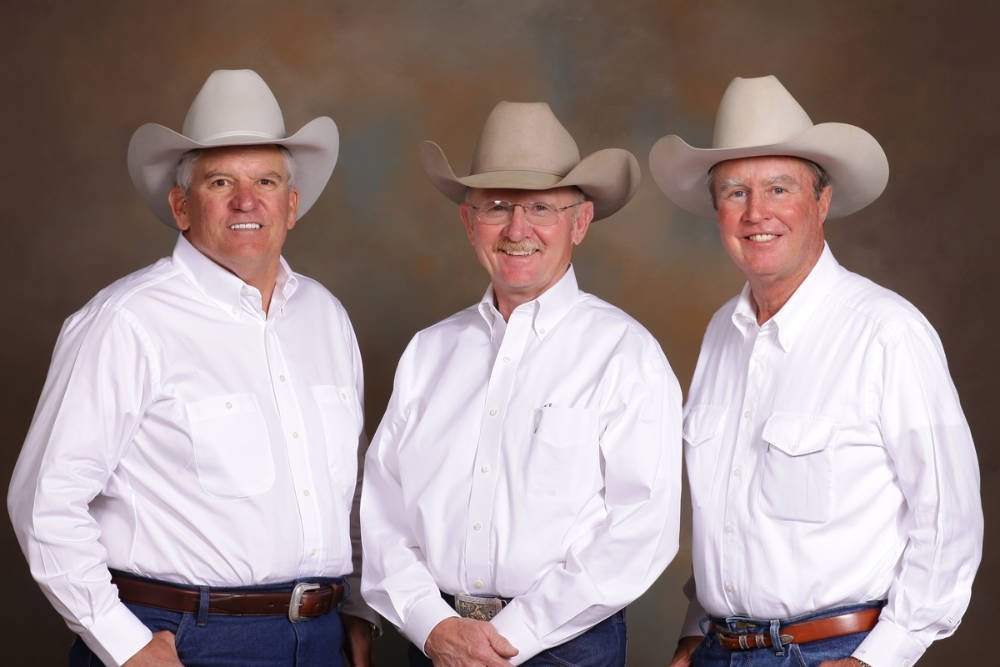Fourth-generation rancher Jon Means has been ordering up cattle trucks since he was just a small child.
In the shade of the big cottonwood tree at his grandfather’s Moon Ranch, young Jon, with toy props in hand, regularly built a set of pens and then proceeded to pen the cattle. He’d then pick up the phone, the real phone, and order some trucks. The call was routed through the switchboard in Valentine. He’d tell the operator, “Send me some trucks.” Later when that operator ran into his grandparents she’d say to them, “Can’t you keep that kid off the phone?”
Today Jon is managing partner of Means Ranch Co. Ltd., headquartered near Valentine in Jeff Davis County. The partnership consists of Jon, his wife Jackie, his sister, Kay Harbison, and their five children. In addition to the Moon Ranch, Jon and Jackie also operate the H-Y Ranch Co. in Grant County, New Mexico. Both are cow/calf operations.
Born September 17, 1951 Jon is the son of the late Barbara and Cole Cowden Means. Ranching, he insists, is all he really ever wanted to do, but he certainly could not foresee that his father’s untimely death would put him in charge of his family’s ranching operation at the tender age of 23, fresh out of TCU’s business school.
The year was 1974, and the cattle industry was still reeling from President Nixon’s March 1973 price freeze on beef. It was a tough time for everyone in the cattle business and particularly so for a young man taking the reins of his family operation.
The Means family has been a West Texas fixture since before Jeff Davis was even a county. Jon’s great-grandfather, John Z. Means, came to this country from the San Saba area in 1884. It is here in the heart of the Davis Mountains, with Sawtooth and Livermore in the backdrop, that Jon was raised, and where he and his wife, Jackie, raised their three children. Jon learned about integrity and work ethic from his father by example.
“He didn’t have to say a lot, because what he did was what he was.”
However, it was his grandmother, Mary Lee Cowden Means, who had the greatest influence on his life.
“Everyone always thinks about what all the pioneer men did. They were working cattle, hunting bears, running lions, going to Fort Worth to sell cattle, while the women were at home having babies in tents. I’m telling you, the women are the people who held the West together.”
He describes his grandmother as a “wise, self-educated woman with a lot of grit. She understood the stock market; she understood the cattle business; she understood the sheep business. She was the kind of woman who got it, and she was a good teacher.”
Means calls “his people” cow people.
“That’s all we’ve ever known is cows.”
Angus and Angus cross cattle have been running on the Means ranch since the 1940s when Jon’s father bought some black cows from Jess Coy who ranched in the San Angelo area. For almost 40 years, Means has worked at improving the genetics in his cow herd. In making his bull selections he looks at the big picture and never concentrates on any one trait. However, in this big open country he needs a bull that can travel. Beyond that he puts a lot of emphasis on maternal traits because fertility is what keeps him in business.
Feeding cattle has been part of the Means Ranch operation since Jon was just a kid. During the 1950s drought, his grandfather and his father put cattle on feed in California’s Imperial Valley. In the 1960s and 70s, his father fed cattle at Clint, and Jon, too, has fed cattle in Kansas and the Texas Panhandle.
Drought has been a fixture in Means’s life and as more than one or two knowledgeable ranchers have said, ranching in this country is more of an art than a science.
“When it gets good here, it’s as good as it is anywhere as far as cattle performance, but it’s a fragile country, and if drought gets out in front of you too far, it’s hard to come back.” He recognizes the importance of conservative stocking. “Here at the Moon Ranch, the numbers in our cow herd are the lowest in decades.”
“We can get through a drought and kind of hold things together, but we can’t do it if we’ve overgrazed.” Jackie credits her husband with having the ability to adapt to an ever-changing environment.
“He doesn’t fight it. He sees opportunities ahead of most others. That’s part of what make him so good at what he does.” There have been a lot of changes during his tenure, but the way he markets his cattle is one of the biggest. The other big change, he says, is the improvement in genetics.
Jon and Jackie have instilled in their three children the same integrity and a work ethic that their own parents taught them.
“It’s pretty simple to me. If you’re honest, hard-working, trustworthy and respectful of others, a lot of the rest will take care of itself.”
All three children have that love of ranching in their blood, but for now they’re all making their way in the world away from the family ranch.
Means is a past president of Texas and Southwestern Cattle Raisers Assn. He serves on the board of National Finance Credit Corp. of Texas, Texas Livestock Marketing, and the National Cattlemen’s Beef Association. He is a former director of the Texas Beef Council. A past president of the Highpoint Soil and Water Conservation District and the Highland Hereford Breeder’s Association, Means currently serves on the Private Lands Advisory Board for the Texas Parks and Wildlife and the Trans-Pecos Pronghorn Restoration Working Group. He is a lifelong member of the Bloys Camp Meeting Association and a former trustee of the Means and Evans Camp.


